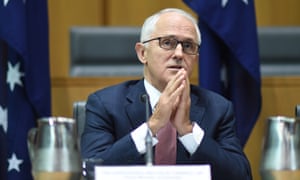Extract from The Guardian
Any remaining optimism Australians had for Malcolm Turnbull
evaporated this week when once again he proved incapable of acting in
the national interest


Here we go again.
Just like last year’s sorry excuse for a debate on taxation reform, where nation building policy ideas were knocked off the table one by one, we find our federal government again unable to act in the national interest when it comes to energy policy.
Unlike the tax debate, there is at least a broad acknowledgement of a problem. Across the nation we are witnessing coal mines close, power bills increase and a collapse in investment for new energy generation. With that in mind, you would think even the biggest supporters of the coal industry, the Turnbull government, could not accept the status quo. The national energy market is failing and now, when a credible solution is put forward the discussion is shut down by the prime minister.
In the absence of a coherent national policy on low carbon energy, state governments including South Australia are being blamed for pursuing ambitious renewable energy targets. What South Australia has done over the last decade is take advantage of its natural advantages to secure investment in cheap clean renewable energy. This leadership has received accolades from clean energy pioneers including Al Gore and Malcolm Turnbull.
My state has been described as the “canary in the coal mine” on energy policy – an ironic description when you consider the fact that our state’s last coal-fired power station shut its doors earlier this year. September’s statewide blackout, which was caused by tornados ripping transmission lines out of the ground, was falsely blamed on renewable energy by those in the pockets of the coal lobby. What these anti-renewable opportunists did achieve was to put the issue of a failing national energy market on the agenda.
A national emissions intensity trading scheme has now been proposed as a mechanism to stimulate investment in our energy market. It provides the transition plan that is needed towards the lowest cost, most reliable and cleanest energy system.
The CSIRO, Australian Energy Market Commission, business groups and the government’s own chief scientist believe this is an idea worthy of consideration at the very least. But before Alan Finkel’s report had even been delivered to Coag, the prime minister dropped the idea like a piping hot double espresso.
A national energy market needs a national solution. That is something we can all agree on. But if, like the tax debate, we are left with nothing on the table then the states will be forced consider their options. If this means designing and implementing our own scheme, then this should also be considered.
Many Australians were optimistic that Malcolm Turnbull’s leadership would provide us with sensible policy debate and action in the national interest. After this week’s events, any remaining optimism has now evaporated.
Jay Weatherill is the premier of South Australia.
Just like last year’s sorry excuse for a debate on taxation reform, where nation building policy ideas were knocked off the table one by one, we find our federal government again unable to act in the national interest when it comes to energy policy.
Unlike the tax debate, there is at least a broad acknowledgement of a problem. Across the nation we are witnessing coal mines close, power bills increase and a collapse in investment for new energy generation. With that in mind, you would think even the biggest supporters of the coal industry, the Turnbull government, could not accept the status quo. The national energy market is failing and now, when a credible solution is put forward the discussion is shut down by the prime minister.
In the absence of a coherent national policy on low carbon energy, state governments including South Australia are being blamed for pursuing ambitious renewable energy targets. What South Australia has done over the last decade is take advantage of its natural advantages to secure investment in cheap clean renewable energy. This leadership has received accolades from clean energy pioneers including Al Gore and Malcolm Turnbull.
My state has been described as the “canary in the coal mine” on energy policy – an ironic description when you consider the fact that our state’s last coal-fired power station shut its doors earlier this year. September’s statewide blackout, which was caused by tornados ripping transmission lines out of the ground, was falsely blamed on renewable energy by those in the pockets of the coal lobby. What these anti-renewable opportunists did achieve was to put the issue of a failing national energy market on the agenda.
A national emissions intensity trading scheme has now been proposed as a mechanism to stimulate investment in our energy market. It provides the transition plan that is needed towards the lowest cost, most reliable and cleanest energy system.
The CSIRO, Australian Energy Market Commission, business groups and the government’s own chief scientist believe this is an idea worthy of consideration at the very least. But before Alan Finkel’s report had even been delivered to Coag, the prime minister dropped the idea like a piping hot double espresso.
A national energy market needs a national solution. That is something we can all agree on. But if, like the tax debate, we are left with nothing on the table then the states will be forced consider their options. If this means designing and implementing our own scheme, then this should also be considered.
Many Australians were optimistic that Malcolm Turnbull’s leadership would provide us with sensible policy debate and action in the national interest. After this week’s events, any remaining optimism has now evaporated.
Jay Weatherill is the premier of South Australia.
No comments:
Post a Comment